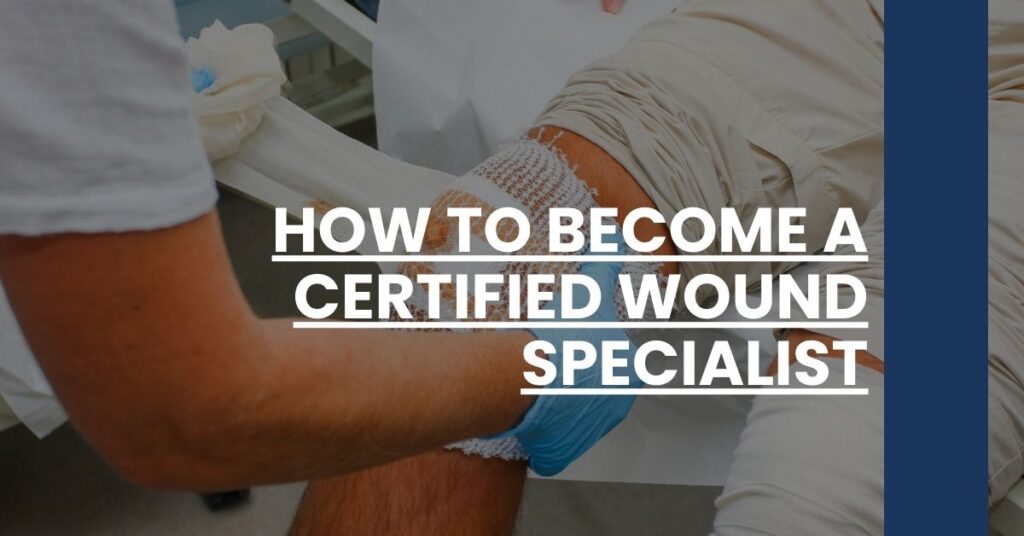How to become a certified wound specialist is a pathway to an invaluable role within healthcare.
- Educational Requirements: Obtaining the necessary degrees and specialized training.
- Clinical Experience: Gaining hands-on practical experience in wound care settings.
- Certification Examination: Preparing for and passing the certification exam from a recognized board.
Start your journey on how to become a certified wound specialist today.
- Understanding the Role of a Wound Specialist
- Education Requirements for Wound Specialists
- Necessary Clinical Experience
- Certification Boards and Options
- Preparing for the Certification Exam
- The Certification Process
- Advanced Certifications and Fellowships
- Investment and Return: Costs, Benefits, and Career Advancement
- Maintaining Certification and Ongoing Education
- Opportunities and Demand for Certified Wound Specialists
- Conclusion: Taking the Next Steps Towards Certification
Understanding the Role of a Wound Specialist
When you develop a passion for healing and patient care, becoming a certified wound specialist can be a rewarding career path. As a professional in this field, your skills are critical to managing complex wound care issues. You’ll find yourself using both cutting-edge technology and tried-and-true medical practices to treat and prevent wounds such as pressure ulcers, diabetic foot ulcers, and surgical incisions.
What Does a Wound Specialist Do?
A certified wound specialist is an expert in wound care, playing a key role in every stage of the healing process, from assessment and treatment plan development to implementing therapies and evaluating their success. Not only must you understand the physiological aspects of wound healing, but you also need to provide emotional support to patients coping with the challenges of their conditions.
- Holistic Care: Your approach is holistic, assessing not just the wound but the entire person.
- Education Focused: You become a resource for educating patients, their families, and other healthcare professionals on best practices in wound prevention and management.
- Continuous Learning: The field of wound care is dynamic, and staying informed about the latest research and techniques is pivotal.
Wound management is complex and requires a keen eye for detail as well as patience and dedication. Your role is vital in improving patients’ quality of life and, in many cases, can be life-saving.
Education Requirements for Wound Specialists
Before charting your course on how to become a certified wound specialist, grasping the educational foundations is essential. This career demands a firm grounding in the sciences, as it’s based heavily on biology, anatomy, and physiology, among other disciplines.
Starting with a Degree
- Undergraduate Education: Typically, a bachelor’s degree in a health-related field is the stepping stone into wound care. For nurses, this might be a Bachelor of Science in Nursing (BSN).
- Graduate Opportunities: Some roles may require a master’s or even a doctoral degree. If you’re looking to take on more responsibility or a leadership position, furthering your education can make a significant difference.
As you progress, focusing on subjects like microbiology and pharmacology can give you an edge. Educational programs should provide not only theoretical knowledge but also practical skills that will be vital in the field.
Necessary Clinical Experience
Hands-on experience is a critical component of your trajectory to becoming a certified wound specialist. Clinical experience allows you to apply theoretical knowledge to real-world scenarios, refining your skills with each patient interaction.
Gaining the Right Experience
- Diverse Settings: Whether it’s acute care, long-term care, or private practice, diverse clinical settings will expose you to different types of wounds and treatment methods.
- Clinical Rotations: Rotate through various specialties during clinical placements to develop comprehensive wound care approaches.
- Preceptorship: Engage in a preceptorship program, working under the guidance of experienced wound care professionals to deepen your understanding of patient care and treatment.
This real-world experience is integral in shaping your capabilities as a wound specialist. It provides a foundation for informed decision-making and develops your confidence in managing complex wound care cases.
Certification Boards and Options
Certification can set you apart in the healthcare field, and several boards offer credentials specifically for wound care professionals. Choosing the right certification for your career goals and field of practice is essential.
Selecting a Certifying Body
- American Board of Wound Management (ABWM): Offers the Certified Wound Specialist (CWS) designation. It’s a well-recognized certification for physicians, nurses, and other healthcare professionals.
- Wound, Ostomy, and Continence Nursing Certification Board (WOCNCB): Ideal for nurses specializing in wound care, providing the Wound Care Certified (WCC) credential.
Selecting the right certifying body involves reviewing requirements, costs, and recognizing which certifications are most valued in your professional community.
Preparing for the Certification Exam
Passing the certification exam is a testament to your expertise in the field of wound care. Effective preparation is non-negotiable and choosing the right study materials and resources is crucial for your success.
Study Materials and Resources
- Review Courses: Consider enrolling in review courses that are often offered by the certifying bodies themselves. These can provide structured study plans and exposure to the exam format.
- Practice Exams: Use practice examinations to gauge your readiness. Through American Board of Wound Management, for instance, you can access various resources to simulate the test-taking experience.
- Study Guides: Leverage Study Guides and other preparation materials which offer insights into the content areas that will be covered on the exam.
By methodically preparing for the certification exam, you are solidifying your knowledge and positioning yourself for success in achieving your goal to become a certified wound specialist.
The Certification Process
Embarking on the certification process is a pivotal step in your journey to becoming a certified wound specialist. This process ensures that you have met all the standardized educational and experiential requirements, and are competent in your knowledge and skills.
Application and Verification
- Gather Documentation: Before applying, ensure you have all necessary documents ready, such as your academic transcripts and proof of clinical experience.
- Submit Application: Fill out an application form from the relevant certifying body, which typically involves detailing your professional experience and education.
- Verification Process: Expect a verification process where your documentation is reviewed to confirm you meet all the eligibility criteria.
The Examination
- Scheduling: Once your application is approved, you’ll schedule an exam at an authorized testing center or through a proctored online exam, depending on availability and your preference.
- Exam Format: Familiarize yourself with the exam format—most are multiple-choice questions covering various aspects of wound management.
Certification and Beyond
- Exam Results: After completion, you will be notified of your results. If you’re successful, you’ll receive your certification, which is typically valid for a specific number of years.
- Recertification: Stay informed about the recertification process, which usually involves continuing education and possibly re-examination to maintain your certified status.
By understanding and skillfully navigating through the certification process, you cement your commitment to excellence in wound care.
Advanced Certifications and Fellowships
For those looking to reach the zenith of their profession, advanced certifications and fellowships can be a beacon of expertise, denoting a mastery in the specialized field of wound care.
Climbing the Ladder
- Specialty Certifications: Consider delving into specialized areas, such as hyperbaric medicine or diabetic wound care, to further refine your expertise.
- Fellowship Programs: Engaging in a fellowship can provide you with an immersive experience, resourcing you with advanced knowledge and techniques that are at the leading edge of wound care science.
Advanced training can transform your career, positioning you not only as a specialist but also as a thought leader and innovator within the field.
Investment and Return: Costs, Benefits, and Career Advancement
Investing in your education and certification has measurable benefits for your career. While it requires both time and financial commitment, the returns on your investment are tangible, paving the way for professional growth and increased compensation.
Weighing the Financials
- Certification Costs: Be prepared for initial costs, which can include application fees, exam fees, and preparation materials.
- Potential Income: Certified wound specialists often benefit from increased earning potential. Your certification is a symbol of your expertise, making you a valuable asset to healthcare organizations.
It’s a proven axiom that the investment in your certification can yield dividends in your career, from job security to opportunities for promotion.
Maintaining Certification and Ongoing Education
Reaching the milestone of certification is just the beginning. You must stay actively engaged in ongoing education to maintain your certified status and keep abreast of the evolving practices in wound care.
The Cycle of Learning
- Continuing Education Units (CEUs): Most certifying bodies will require you to complete a certain amount of CEUs within a certification period.
- Learning Platforms: There are many resources available for continuing education, including online courses, workshops, and conferences dedicated to wound care.
- Recertification: Keep a record of all your educational activities as you’ll need to provide evidence of your ongoing education when you apply for recertification.
By committing to lifelong learning, you will not only maintain your certification but also thrive as a wound care expert.
Opportunities and Demand for Certified Wound Specialists
The expertise of certified wound specialists is in high demand, as they are integral to improving clinical outcomes for patients with acute and chronic wounds.
The Job Market Awaits
- Varied Settings: Your certification opens doors to employment in a variety of healthcare settings, including hospitals, outpatient clinics, long-term care facilities, and private practices.
- Growing Demand: With an aging population and the rise in conditions like diabetes that can lead to complications requiring wound care, the need for certified wound specialists is growing.
A certification in wound care not only increases your employability but also contributes to a meaningful role in improving patient care quality.
Conclusion: Taking the Next Steps Towards Certification
When you search “how to become a certified wound specialist,” the journey may seem extensive. But every step taken is a building block towards a fulfilling career dedicated to the care and healing of others.
Now that you have a roadmap, it’s time to begin the journey. Whether you’re obtaining the necessary education, gaining invaluable clinical experience, or seeking advanced certifications, the path to becoming a certified wound specialist is clear. With dedication and continuous learning, your role in transforming patient lives is within reach, and your expertise as a wound care professional will be both recognized and rewarded in the healthcare community. Start your journey today and join the ranks of healthcare’s unsung heroes.
Learn how to become a certified wound specialist with our step-by-step guide to education, certification, and career advancement.

